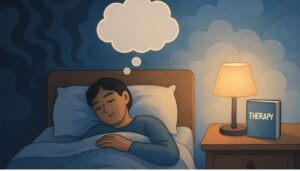Introduction to effects of Seraquil on Rem Sleep
Sleep is an essential logical function influencing cognitive performance, emotional regulation, and physical health. Of the various sleep stages, rapid eye movement (REM) sleep plays a critical role in memory consolidation, emotional processing, and brain development. Medications that alter REM sleep can significantly impact these processes, leading to various cognitive and health-related consequences. Seroquel, a widely used antipsychotic medication, has garnered attention for its effects on sleep, particularly its impact on REM sleep.
In this article, we explore Seroquel’s effects on REM sleep, its mechanisms of action, and its broader implications for individuals using the drug. The focus will be on understanding the significance of REM sleep, how Seroquel affects sleep architecture, and the potential health outcomes associated with its use.
What is Seroquel (Quetiapine)?
Seroquel, known by its generic name quetiapine, is an atypical antipsychotic used to treat a range of psychiatric conditions, including schizophrenia, bipolar disorder, and major depressive disorder. In addition to its primary use, Seroquel is often prescribed off-label for sleep disturbances, particularly in individuals experiencing insomnia or anxiety.
Seroquel targets various neurotransmitter receptors in the brain, including serotonin (5-HT2A) and dopamine (D2) receptors. By modulating these neurotransmitters, Seroquel helps alleviate psychotic symptoms, stabilize mood, and promote a calming effect, which can aid in improving sleep quality. However, its influence on sleep extends beyond merely inducing sedation; it also affects the architecture of sleep, particularly REM sleep.
Understanding REM Sleep
To appreciate the impact of Seroquel on REM sleep, it is essential first to understand the basics of sleep architecture. Sleep is divided into two main stages: non-rapid eye movement (NREM) sleep and rapid eye movement (REM) sleep. NREM sleep is further divided into three stages: N1, N2, and N3, with N3 being sleep’s deep, restorative phase. REM sleep, on the other hand, is characterized by vivid dreams, muscle atonia (paralysis), and increased brain activity that is similar to wakefulness.
REM sleep typically occurs about 90 minutes after falling asleep and recurs in cycles throughout the night, accounting for 20-25% of total sleep time in healthy adults. This sleep phase is crucial for emotional regulation, cognitive function, and memory consolidation. Disruptions to REM sleep have been linked to mood disorders, cognitive impairments, and a decrease in overall sleep quality.
Seroquel’s Impact on Sleep Architecture
Seroquel is known to have a sedative effect due to its antihistamine properties, making it an effective option for individuals suffering from insomnia or disrupted sleep. However, its impact on sleep architecture, specifically REM sleep, is more complex.
- Reduction in REM Sleep Duration: One of Seroquel’s most significant effects on REM sleep is a reduction in the time spent in this sleep stage. Studies have shown that individuals taking Seroquel experience decreased REM sleep latency (the time it takes to enter REM sleep) and the duration of REM sleep cycles. This reduction in REM sleep can lead to changes in dream patterns, often resulting in fewer or less vivid dreams.
- Increased NREM Sleep: While Seroquel reduces REM sleep, it has increased NREM sleep, particularly the deep N3 stage. This shift in sleep architecture can enhance sleep’s restorative functions, leading to improved feelings of restfulness upon waking. However, the trade-off is decreased cognitive and emotional benefits of REM sleep.
- Effects on Sleep Continuity: Seroquel has been shown to improve sleep continuity by reducing the number of awakenings during the night. This can be particularly beneficial for individuals with insomnia or anxiety-related sleep disturbances. However, while sleep may be more continuous, reducing REM sleep could have long-term consequences on cognitive function and emotional regulation.
Mechanisms Behind Seroquel’s Effects on REM Sleep
Seroquel’s impact on REM sleep can be attributed to its interaction with various neurotransmitter systems in the brain, particularly serotonin and dopamine. These neurotransmitters regulate the sleep-wake cycle and the transition between different sleep stages.
- Serotonin Modulation: Seroquel acts as an antagonist at serotonin 5-HT2A receptors, which are involved in the regulation of sleep and REM sleep in particular. By blocking these receptors, Seroquel reduces the signaling that promotes REM sleep, decreasing REM sleep duration. This is consistent with the observation that other drugs that affect serotonin, such as selective serotonin reuptake inhibitors (SSRIs), also reduce REM sleep.
- Dopamine Inhibition: Seroquel’s antagonistic effect on dopamine D2 receptors contributes to its antipsychotic properties and affects sleep. Dopamine is a wake-promoting neurotransmitter, and by inhibiting its action, Seroquel induces a sedative effect that promotes sleep onset. However, this dopamine inhibition may also disrupt the normal cycling between REM and NREM sleep, further contributing to the reduction in REM sleep.
- Histamine Blockade: Seroquel’s potent antihistamine effects, particularly its antagonism of histamine H1 receptors, are responsible for its sedative properties. Histamine is a key neurotransmitter involved in wakefulness, and by blocking its action, Seroquel promotes drowsiness and sleep. However, this strong sedative effect may also blunt the normal fluctuations in brain activity characteristic of REM sleep.
Clinical Implications of Reduced REM Sleep
While Seroquel’s sedative effects can be beneficial for individuals struggling with insomnia or anxiety, the reduction in REM sleep may have unintended consequences. REM sleep is critical for several physiological and cognitive processes, and prolonged suppression of this sleep stage could lead to:
- Cognitive Impairments: REM sleep is essential for memory consolidation, particularly procedural and emotional memories. Reduced REM sleep may impair an individual’s ability to retain and process new information, potentially leading to memory deficits over time.
- Emotional Dysregulation: The emotional regulation functions of REM sleep are well-documented. Disruptions of REM sleep can lead to mood instability, increased anxiety, and a higher susceptibility to stress. For individuals with mood disorders, such as those taking Seroquel, the reduction in REM sleep could exacerbate emotional symptoms, particularly in the long term.
- REM Sleep Rebound: After discontinuing, individuals may experience a phenomenon known as REM sleep rebound, where REM sleep increases dramatically to compensate for the previous suppression. This can result in vivid dreams or nightmares, which may be distressing for some individuals. The abrupt return of REM sleep can also lead to fragmented sleep and increased nighttime awakenings.
Long-Term Effects and Considerations
The long-term effects of REM sleep are still an area of active research. While short-term use of Seroquel can be beneficial for managing acute sleep disturbances, prolonged use may carry risks related to REM sleep suppression. Some potential long-term effects include:
- Risk of Cognitive Decline: Chronic suppression of REM sleep has been associated with an increased risk of cognitive decline, particularly in older adults. Given that is often prescribed to elderly patients for sleep or behavioral disturbances, the potential impact on cognitive health should be carefully considered.
- Impact on Mental Health: For individuals with mood disorders, the reduction in REM sleep may have a paradoxical effect, where the initial improvement in sleep quality is offset by long-term emotional dysregulation. Healthcare providers should carefully monitor patients for any changes in mood or anxiety symptoms during long-term Seroquel use.
- Dependence and Withdrawal: Seroquel’s sedative effects can lead to dependence, where individuals may struggle to sleep without the medication. Upon discontinuation, withdrawal symptoms, including REM sleep rebound, may occur, making it difficult for individuals to regain a normal sleep pattern.
Conclusion
Seroquel is a valuable medication for treating psychiatric conditions and improving sleep in individuals with insomnia or anxiety-related sleep disturbances. However, its impact on REM sleep raises important considerations for long-term use. While enhances sleep continuity and increases deep NREM sleep, suppressing REM sleep can lead to cognitive and emotional consequences.
For individuals taking, weighing the benefits of improved sleep quality against the potential risks of REM sleep suppression is essential. Healthcare providers should carefully monitor patients, especially those on long-term therapy, to ensure that reducing REM sleep does not lead to adverse outcomes. In some cases, adjusting the dosage or exploring alternative treatments may be necessary to balance effective symptom management and maintaining a healthy sleep architecture.
Frequently Asked Questions (FAQs)
Can Seroquel cause changes in sleep patterns?
Yes, Seroquel can affect sleep patterns by promoting deep sleep (NREM) and reducing REM sleep, which may lead to fewer or less vivid dreams. While it can improve sleep continuity, prolonged suppression of REM sleep may impact memory and emotional regulation.
How does Seroquel help with insomnia?
Seroquel is often used off-label to treat insomnia because of its sedative properties. It blocks the brain’s histamine and other neurotransmitter receptors, promoting sleep onset and reducing nighttime awakenings. However, it may affect the balance between different sleep stages.
Is it safe to take Seroquel long-term for sleep issues?
A healthcare provider should carefully monitor long-term sleep use. While it can improve sleep in the short term, prolonged suppression of REM sleep can have cognitive and emotional consequences, especially in older adults or those with mood disorders.
Does Seroquel cause REM sleep to rebound after discontinuation?
Yes, after stopping, some individuals may experience REM sleep rebound, which leads to increased REM sleep with vivid dreams or nightmares. This can be accompanied by fragmented sleep during the adjustment period.
Can Seroquel improve sleep quality in people with anxiety?
Seroquel can improve sleep quality in individuals with anxiety by reducing restlessness and promoting longer periods of uninterrupted sleep. However, while sleep may improve, the drug may alter normal REM sleep cycles, which can have emotional effects over time.
What are the risks of using Seroquel for sleep without a prescription?
Using Seroquel without a prescription for sleep can be risky due to its side effects, such as dizziness, sedation, and potentially long-term impact on REM sleep. It is crucial to consult with a healthcare provider to ensure it is the appropriate treatment for your sleep disturbances.
READ ALSO: Exclusiveflirts: A Comprehensive Guide






















